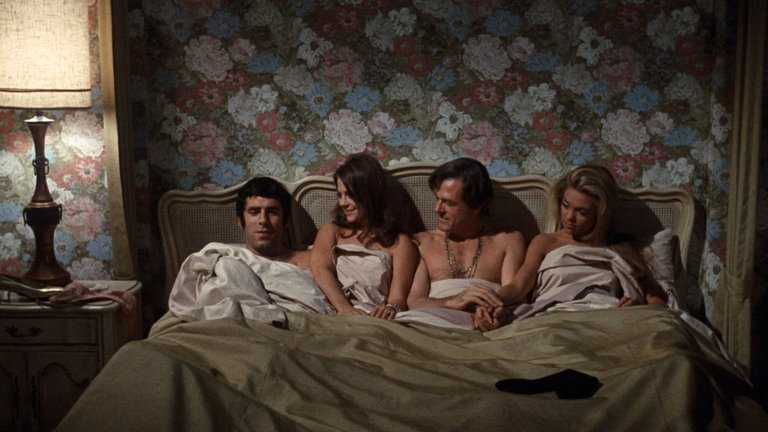Film Review: Bob & Carol & Ted & Alice (1969)

The Sexual Revolution of the 1960s arrived at a moment of profound structural upheaval in Hollywood, catching an industry in transition caused by the collapse of the studio system and the abandonment of the restrictive Production Code As antitrust rulings dismantled vertical integration and television eroded cinema’s cultural dominance, studios found themselves ill-prepared to address the rapidly evolving sexual mores of a younger, liberated audience. While exploitation films capitalised on nudity and sensationalism, Paul Mazursky’s 1969 directorial debut Bob & Carol & Ted & Alice attempted a more nuanced exploration of how shifting attitudes towards monogamy and emotional transparency affected relationships. Blending satire with psychological drama, the film became both a commercial success and a cultural lightning rod – one whose legacy now rests more on historical curiosity than enduring relevance.
Mazursky drew direct inspiration from California’s Esalen Institute, a bastion of the Human Potential Movement that promoted Gestalt therapy, sensory awareness, and New Age philosophies. His visit to the retreat with his wife informed the film’s opening act, where documentary filmmaker Bob Sanders (played by Robert Culp) and wife Carol (played by Natalie Wood) attend a fictionalised version of Esalen. Through group therapy sessions encouraging radical honesty, the couple adopts a philosophy of unfiltered emotional expression – a conceit that drives the narrative when Bob later confesses a casual affair. The institute’s influence is palpable in Mazursky’s sympathetic yet sceptical portrayal of countercultural self-actualisation, framing it as both liberating and socially destabilising.
The Sanders’ embrace of “enlightened” non-monogamy forms the film’s central conflict. After Bob’s matter-of-fact admission of infidelity, Carol reacts with performative equanimity, later reciprocating with her own dalliance. Their friends Ted (played by Elliott Gould) and Alice (played by Dyan Cannon) initially recoil at this rejection of traditional marital boundaries, yet gradually succumb to curiosity. What begins as intellectual posturing – Ted’s awkward attempt at an affair, Alice’s sardonic critiques – culminates in a climactic hotel-room confrontation where all four characters tentatively explore partner-swapping. Mazursky structures these escalating transgressions as a series of comedic yet cringe-inducing set pieces, underscoring the gap between progressive ideals and visceral human insecurities.
Co-written with Larry Tucker, the script balances romantic drama and sex comedy through dialogue-driven humour and restrained physicality. Mazursky avoids the raunchiness of later 1970s films, opting instead for wry observations on middle-aged suburbanites clumsily adopting free-love rhetoric. Natalie Wood shines as Carol, blending ethereal charm with understated comic timing – particularly in scenes where her character’s forced serenity masks deeper anxieties. Elliott Gould’s neurotic Ted provides a perfect foil, his deadpan delivery highlighting the absurdity of using transactional logic (“You’ve got the guilt anyway. Don’t waste it”) to justify infidelity. Supported by Charles Lang’s crisp cinematography and Quincy Jones’s lounge-infused score, the ensemble elevates material that could easily veer into farce.
Modern viewers may struggle to reconcile the film’s reputation as daring with its comparatively tame content. While there is some nudity, especially at the opening scene featuring women at institute, Wood and Cannon appear only in undergarments. The much-discussed “orgy” scene concludes with an abrupt retreat to conventional pairings. Mazursky undermines his own premise through a final act that privileges cautious moderation over revolutionary fervour. The much-criticised ending – a slow-motion procession of multicultural couples set to Burt Bacharach’s “What the World Needs Now Is Love” – feels less like a profound statement on universal connection than a sentimental cop-out. This tonal indecision reflects broader cultural ambivalence: the film critiques bourgeois hypocrisy yet stops short of endorsing full sexual liberation.
Though hailed as Mazursky’s finest work and a box-office triumph, Bob & Carol & Ted & Alice aged rapidly as the Sexual Revolution gave way to 1970s disillusionment. By 1973, an ill-fated sitcom adaptation underscored how quickly its themes had become passé. Today, the film serves less as a daring manifesto than a snapshot of upper-middle-class anxieties during a fleeting period of experimentation. The AIDS crisis, conservative backlash, and Boomers’ own embrace of monogamy would soon render its dilemmas quaint – a reminder that Hollywood’s attempts to codify cultural shifts often ossify into historical artefacts. Mazursky’s achievement lies not in timeless insight, but in capturing the awkward birth pangs of a revolution that never fully arrived.
RATING: 6/10 (++)
Blog in Croatian https://draxblog.com
Blog in English https://draxreview.wordpress.com/
InLeo blog https://inleo.io/@drax.leo
Hiveonboard: https://hiveonboard.com?ref=drax
InLeo: https://inleo.io/signup?referral=drax.leo
Rising Star game: https://www.risingstargame.com?referrer=drax
1Inch: https://1inch.exchange/#/r/0x83823d8CCB74F828148258BB4457642124b1328e
BTC donations: 1EWxiMiP6iiG9rger3NuUSd6HByaxQWafG
ETH donations: 0xB305F144323b99e6f8b1d66f5D7DE78B498C32A7
BCH donations: qpvxw0jax79lhmvlgcldkzpqanf03r9cjv8y6gtmk9
Posted Using INLEO